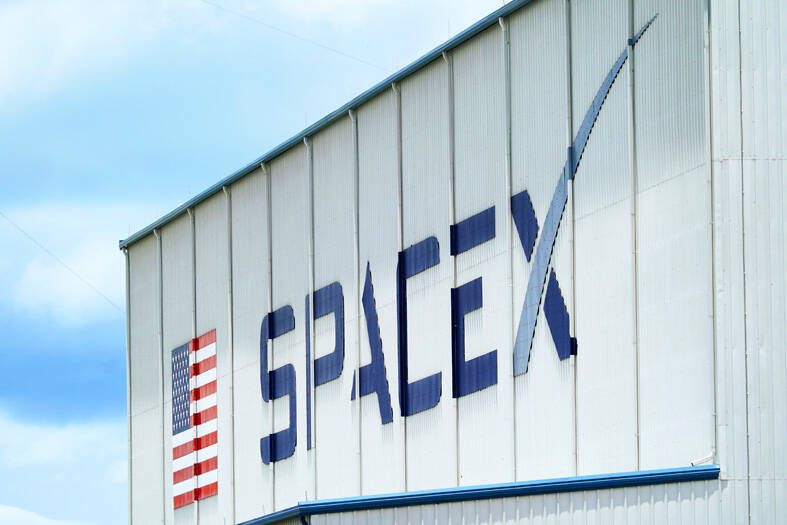The Ministry of Economic Affairs (MOEA) yesterday disputed reports that suppliers to US-based Space Exploration Technologies Corp (SpaceX) had been asked to move production out of Taiwan.
Reuters had reported on Tuesday last week that Elon Musk-owned SpaceX had asked their manufacturers to produce outside of Taiwan given geopolitical risks and that at least one Taiwanese supplier had been pushed to relocate production to Vietnam.
SpaceX’s requests place a renewed focus on the contentious relationship Musk has had with Taiwan, especially after he said last year that Taiwan is an “integral part” of China, sparking sharp criticism from Taiwanese authorities.

Photo: David J. Phillip, AP
The ministry said that it had contacted the Taiwanese suppliers cited in the Reuters report and found that none of them had received such a request from SpaceX.
The suppliers provide services to global clients and often adjust their production to meet clients’ needs, but so far they have not been asked to move their production overseas, the ministry added.
“Taiwan is capable of developing its own ground station equipment for satellite reception, and its manufacturers are highly competitive,” the ministry said.
“The ministry is not aware of any production relocation of these firms [and] has faith that any short-term political factors would not affect their ties with international satellite companies,” it added.
Faced with growing trade tensions between the US and China, escalating geopolitical unease and a global trend of economically decoupling with China, many Taiwanese suppliers have diversified their production in the global market and have become highly flexible in dealing with changes, the ministry said.
Forty-six Taiwanese component makers have entered the global satellite supply chain, covering a wide range of products, such as raw material components, printed circuit boards, wires, cables and power management solutions, it said.
Taiwanese suppliers who can develop high, medium and low Earth orbit satellite services also cater to international clients, including telecom operators and satellite equipment suppliers, the ministry added.
The electronics and information communication industries, the semiconductor business in particular, have become an indispensable part of the global supplier chain, the ministry said.
While the local electronic component industry has continued to increase production and upgrade technologies on its own to lay a good foundation for the satellite business, the government has since 2021 also assisted about 30 companies in developing ground station equipment to build robust connections with the global supply chain, the ministry said.

UNCERTAINTIES: Exports surged 34.1% and private investment grew 7.03% to outpace expectations in the first half, although US tariffs could stall momentum The Chung-Hua Institution for Economic Research (CIER, 中華經濟研究院) yesterday raised its GDP growth forecast to 3.05 percent this year on a robust first-half performance, but warned that US tariff threats and external uncertainty could stall momentum in the second half of the year. “The first half proved exceptionally strong, allowing room for optimism,” CIER president Lien Hsien-ming (連賢明) said. “But the growth momentum may slow moving forward due to US tariffs.” The tariff threat poses definite downside risks, although the scale of the impact remains unclear given the unpredictability of US President Donald Trump’s policies, Lien said. Despite the headwinds, Taiwan is likely

When Lika Megreladze was a child, life in her native western Georgian region of Guria revolved around tea. Her mother worked for decades as a scientist at the Soviet Union’s Institute of Tea and Subtropical Crops in the village of Anaseuli, Georgia, perfecting cultivation methods for a Georgian tea industry that supplied the bulk of the vast communist state’s brews. “When I was a child, this was only my mum’s workplace. Only later I realized that it was something big,” she said. Now, the institute lies abandoned. Yellowed papers are strewn around its decaying corridors, and a statue of Soviet founder Vladimir Lenin

UNIFYING OPPOSITION: Numerous companies have registered complaints over the potential levies, bringing together rival automakers in voicing their reservations US President Donald Trump is readying plans for industry-specific tariffs to kick in alongside his country-by-country duties in two weeks, ramping up his push to reshape the US’ standing in the global trading system by penalizing purchases from abroad. Administration officials could release details of Trump’s planned 50 percent duty on copper in the days before they are set to take effect on Friday next week, a person familiar with the matter said. That is the same date Trump’s “reciprocal” levies on products from more than 100 nations are slated to begin. Trump on Tuesday said that he is likely to impose tariffs

READY TO BUY: Shortly after Nvidia announced the approval, Chinese firms scrambled to order the H20 GPUs, which the company must send to the US government for approval Nvidia Corp chief executive officer Jensen Huang (黃仁勳) late on Monday said the technology giant has won approval from US President Donald Trump’s administration to sell its advanced H20 graphics processing units (GPUs) used to develop artificial intelligence (AI) to China. The news came in a company blog post late on Monday and Huang also spoke about the coup on China’s state-run China Global Television Network in remarks shown on X. “The US government has assured Nvidia that licenses will be granted, and Nvidia hopes to start deliveries soon,” the post said. “Today, I’m announcing that the US government has approved for us